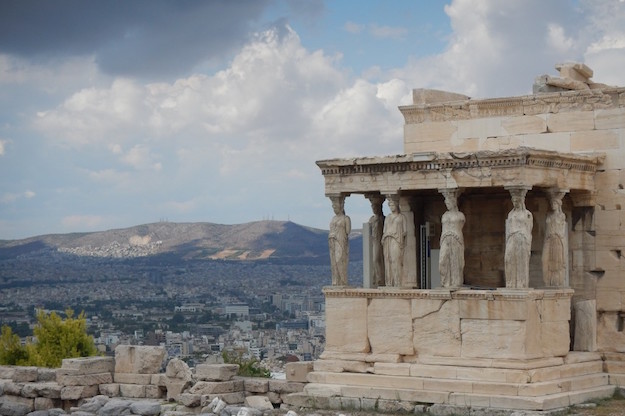When the ancient Greeks created something they did so because of their beliefs in bettering themselves in their body, soul, and minds. They knew that by acting in a ‘we’ mentality vs a ‘me’ mentality, that the stronger their individuals became, the strong their society would become.
 Referred to as either the Erechtheion or Erechtheum, this ancient Greek Temple, found on the acropolis in Athens, Greece, was built between 421 and 406 BC and was dedicated to Poseidon and Athena. Photo credit: Rachel Kristensen
Referred to as either the Erechtheion or Erechtheum, this ancient Greek Temple, found on the acropolis in Athens, Greece, was built between 421 and 406 BC and was dedicated to Poseidon and Athena. Photo credit: Rachel Kristensen
Stadiums and gymnasiums were built across ancient Greece to train their soldiers. Competitive games such as the Olympics served for sporting purposes to perfect the body. Every four years, a sacred truce would be announced, no wars would take place for the one month leading up to the games and for the entire duration.
Boys and men from all over Greece would descend on Olympia, swear to Zeus while standing on a set of bull testicles (the origins of the world ‘testify’) that they had trained for the one year prior, they were 100% Greek and they would not cheat.
Cheaters were shamed with a wall of statues dedicated to Zeus, on display as athletes walked into the ancient tracks and would bear the disgrace of being spat on by every passerby for centuries to come. Winners were awarded with not only the olive crown but free food for life and a city-state that would boast your name for the duration of your life.
There was no greater honour than to have an Olympian in your community.
The games were similar in essence to our modern games. Sponsors had their forum, hotels for the wealthy were supplied, and competition was fierce.
Unlike today, we have to use our imagination as to how fast or how strong these nude athletes were. Glory was never recorded in times or distances, only in the names and years of their victory.
Imagine what the Olympics today would be like if weren't focused on personal bests or world records.
For their souls, the Greeks erected many temples to worship in.
Temples for the 12 Olympic gods carved in fine marble, sprawling complexes built with stadiums and theatres nearby.
Olympia had the giant Statue of Zeus, an ancient wonder of the world crafted with ivory and gold that stood above an olive oil pool making Zeus life-like.
In Delphi, the Temple of Apollo stood above two tectonic plates emitting a hallucinogenic gas which allowed an oracle to invoke the spirit of the gods and speak with the people. She responded to questions in a very vague manner, and the gods required one to know thyself before deciphering their answer.
The ancient Greeks clearly understood that understanding your own self would keep you better connected with your soul.
For their last pillar of creating a better person, theatres became the natural setting to expand the mind.
As early as 5th century BC in theatres dedicated to Dionysus in Athens, Epidaurus or Delphi, audiences would watch performances based on real life tragedies that would pose moral dilemmas faced by the citizens or state.
Plagued by continual wars against outsiders like the Persians or internal wars where Greek city-states fought against themselves for power, the ancient Greeks were no stranger to the traumas faced by soldiers.
Plays such as Sophocles’ Ajax spoke directly to the people as a character and a dilemma many could relate to.
Ajax, a solider of the Trojan war, became enraged and tortured by his experiences. His depression, and anger left him with an inability to grip current reality from the murderous reality of war. In the play he is duped by Athena to try to murder his comrades but after he lashes out, he has to try to deal with a shame he brought to himself. Ultimately, the pain and shame is too much and he commits suicide.
This theme was written nearly 2,500 years ago.
In no war has any army left with clean hands. No matter how small the fight, someone will ultimately lose and at the hand of another. The Greeks understood this and its enormous emotional impact on their people. If that impact was left without being addressed it would eat away at their society. So plays were performed as a therapy and a community forum to discuss the problems of soldiers.
Now picture this in our present day life.
Armies all over the world continue to fight battles. As an example, the largest military, the US Army has over 21 million veterans. In 2008, only 40,000 US soldiers were admitting to suffering some sort of post-traumatic stress syndrome. No one was talking about it, and at less than 1% of people admitting to the stress after war, something needed to be done.
In an effort to remove some of the stigmas attached to PTSD, the internal depression and struggles that many soldiers face, the Americans created the 'Theatre of War'. Ancient plays such as Ajax are being performed for groups of veterans for the same reason the Greeks performed it: as a therapy and community forum to discuss the problems facing soldiers.
If one considers how a society thousands of years old created not only art that has enchanted and is still treasured, a premier sporting event played today, but crafted a form of therapy that would be relevant thousands of years later, it makes the magic of ancient Greece even more impressive.
Join us and find out more about our next Classical Greece Tour.